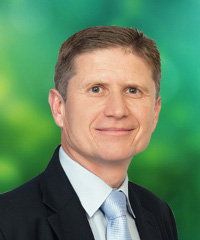A monk may seem an unlikely business leader, but Marko Saravanja has made the transition seamlessly. Saravanja is the co-founder and chairperson of Regenesys Business School, a tertiary education institution based in Sandton, South Africa. Originally from Croatia, he became a monk at the age of 21, following the traditions of the Ananda Marga yoga and meditation movement.
Saravanja arrived in South Africa in 1991 with the aim of helping those in need, and worked as a volunteer in Orange Farm township south of Johannesburg for some years. He lived an ascetic life, with no luxuries or material possessions.
Then in 1995 a change came. Saravanja decided that he wanted to leave his life as a monk and enjoy worldly pleasures, such as falling in love, starting a family and gaining material wealth.
“So I got a job at [the University of the Witwatersrand] and I started my life from scratch, from nothing. When I left [my life as a monk] I had nothing except my orange robes. I didn’t have a TV or even a bed to sleep on,” he tells How we made it in Africa.
In 1998, along with his colleagues Penny Law and William Vivian, Saravanja started Regenesys Business School. His inspiration was to start a business and management school that not only focused on rational thinking, but also emotional and spiritual intelligence.
Saravanja describes emotional intelligence as the ability to understand the needs of others, to inspire others, to exercise compassion and gratitude and to be humble. As a monk, he had developed his emotional and spiritual intelligence through meditation, living a simple life uncorrupted by material belongings, and helping people through volunteer work.
“Those things are actually very important in terms of leadership and management and that is what is missing from our education system and from business schools. Business schools globally tend to produce MBA graduates and business graduates who are quite arrogant and they think they know it all,” he explains, adding that people who lack humility, compassion and gratitude are usually neither happy nor capable of reaching their full potential.
Spiritual intelligence, he notes, is about identifying and understanding one’s purpose in life to achieve greater things and to make the world a better place through serving and helping others. “If you look at all the successful entrepreneurs, they utilise this emotional and spiritual intelligence. For example, intuition or gut feeling is an aspect of spiritual intelligence.”
Over the past 16 years, Regenesys has grown to educate over 100,000 people. Saravanja has also received his PhD in performance management and is the published author of Secrets of Success.
Using his understanding of emotional and spiritual intelligence, Saravanja suggests three interconnected qualities that will lead to entrepreneurial and business success.
1. Dream big, think big
“If you think small you become small,” says Saravanja. He advises entrepreneurs to develop their spiritual intelligence by defining their life dream or purpose.
“It’s so important to dream big, think big, because everything starts with big dreams. Big dreams inspire us, they stretch us, and without dreams there is no success.”
He notes that money and material things will never inspire quite like the understanding of a higher purpose or goal.
2. Perseverance and self-affirmation
According to Saravanja, big dreams cannot be reached without perseverance, hard work and self-discipline. He added that ambition and the desire to achieve one’s goals has the power to keep entrepreneurs working 18 hour days without even thinking of eating or sleeping. “If you have a desire and ambition to succeed then self-disciple comes naturally.”
Saravanja recommends a simple exercise he learnt as monk to maintain focus and motivation.
“I do something called affirmation. So affirmation is one sentence, one thought… I repeat this thought every day so this thought goes into my subconscious mind, and it affects the way I think, the way I behave, the way I act. It’s very powerful because what you think you become.”
Saravanja has used this technique for years to help him to achieve all his goals. For example, he used to focus on thinking “I am healthy, I am fit” every day until he found that it inspired him to want to play sport and eat healthily. He did the same on an intellectual level in order to get his PhD and write his book.
“Our actions are influenced by our behaviours and attitudes and our behaviours and attitudes are influenced by our thoughts. So in order to change our actions we have to change our thoughts. So everything starts with thoughts, ideas or dreams.”
3. Fall in love with your dream
“When we fall in love with the things we do, work stops being work. We don’t think about headaches and problems… we look forward to going to work. You get lost in time. We behave like we are in love with our partner,” highlights Saravanja.
“When you are in love with your partner you operate on a higher level… everything is possible, you want to run an extra mile… you don’t count hours [spent with them] and what you do… you get so much happiness.”
The same thing will happen for entrepreneurs who love their work, clients and customers, adds Saravanja.
“So when you fall in love with your purpose you fall in love with your clients… Clients and customers will want to be a part of that.”

No comments:
Post a Comment